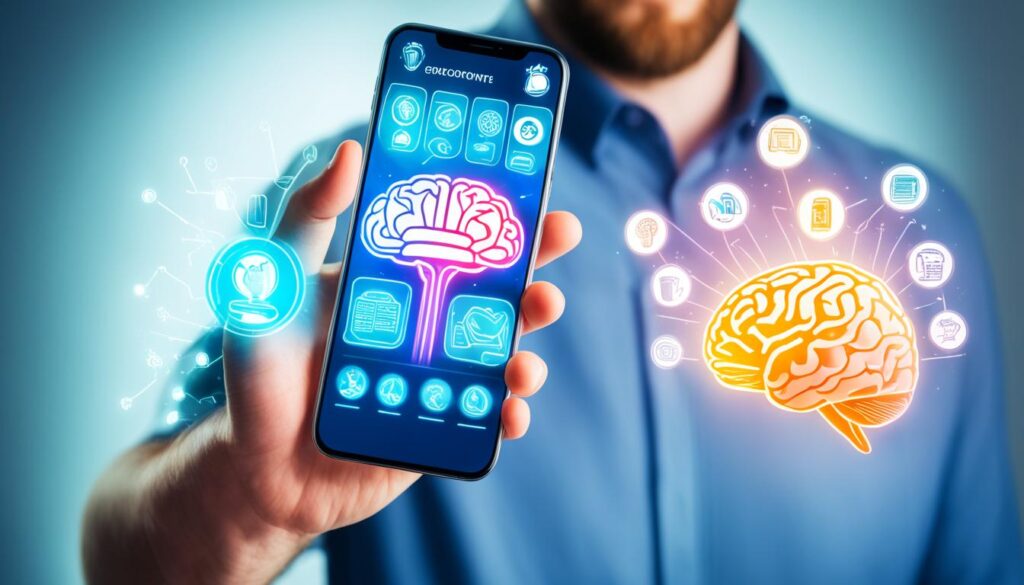Are Smartphones Making Us Smarter? Insights Revealed
In today’s digital age, smartphones have become an essential part of our daily lives. They provide instant access to a wealth of information, keep us connected to the world, and offer endless conveniences. But have you ever stopped to wonder if these devices are truly making us smarter? Are smartphones enhancing our cognitive abilities, or are they actually hindering our intellectual growth?
Recent research suggests that smartphones may not be the cognitive boosters we believe them to be. In fact, they may have a significant impact on our attention, memory, and learning capabilities. The constant presence of a smartphone can distract us, reducing our cognitive resources and lowering our performance on cognitive tests.
So, the question remains: Are smartphones really making us smarter as we navigate the complexities of the modern world?
Key Takeaways:
- Smartphones may not enhance our cognitive abilities as much as we think.
- They can impact our attention, memory, and learning capabilities.
- The mere presence of a smartphone can lower our scores on cognitive tests.
- Smartphones can contribute to addiction, sleep disorders, and damage personal and professional relationships.
- Despite the convenience and access to information, smartphones may not be making us smarter in the long run.
The Cognitive Effects of Smartphones
Research has shown that smartphones can have a significant impact on our cognitive abilities, affecting our attention, memory, and learning processes. When we divide our attention between various tasks, our cognitive resources become limited, compromising our ability to perform at our best.
A study conducted at the University of Texas revealed that the mere presence of a smartphone, even on silent mode, can negatively affect our cognitive performance. This suggests that smartphones consume cognitive capacity even when they are not actively being used.
Furthermore, smartphones have the potential to hinder our ability to learn and comprehend new information effectively. As our attention is divided between the screen and the real world, we may not fully engage our cognitive processes, limiting our comprehension and retention of the material.
Emerging evidence suggests that the influence of smartphones on learning and cognition may not be beneficial in the long run. It is crucial to recognize the potential negative effects of excessive smartphone usage on our cognitive abilities and take proactive steps to mitigate these impacts.
| Cognitive Aspect | Impact |
|---|---|
| Attention | Divided focus, reduced ability to concentrate |
| Memory | Impaired recall, reduced information retention |
| Learning | Decreased comprehension, limited cognitive engagement |
As we gain a better understanding of the cognitive effects of smartphones, it is important to strike a balance between the benefits of smartphone usage and the potential drawbacks. By establishing healthy smartphone habits and limiting unnecessary distractions, we can optimize our cognitive performance and promote effective learning.
The Importance of Digital Detox
“In a world where we are constantly surrounded by digital devices, taking time for a digital detox can provide the necessary mental space and clarity to enhance our cognitive abilities.”
Engaging in regular digital detoxes can help reduce the cognitive load associated with constant smartphone usage. By consciously disconnecting from our devices, we allow our minds to rest, recover, and recharge. This can ultimately enhance our ability to focus, concentrate, and retain information.
Additionally, establishing structured periods of dedicated cognitive engagement, free from distractions, can significantly improve our learning outcomes. By minimizing smartphone interruptions and cultivating focused learning environments, we can optimize our cognitive abilities and achieve more efficient and effective learning.
Understanding the cognitive effects of smartphones allows us to make informed decisions about our device usage. While smartphones provide numerous benefits and conveniences, it is essential to be mindful of their potential impact on our cognitive abilities. By finding the right balance and adopting healthy smartphone habits, we can navigate the digital world while maximizing our cognitive potential.
The Impact on Personal and Professional Relationships

Smartphone usage has a significant impact on personal and professional relationships. The constant checking of devices due to the allure of messages and social media notifications can result in disengagement with those around us, compromising the quality of our relationships. This continuous interruption can also hinder our ability to build and maintain real-life connections, leading to breakdowns in communication and a lack of meaningful interaction.
Furthermore, the reliance on smartphones for social validation can have detrimental effects on self-esteem and confidence. Some individuals base their self-worth on the approval they receive on social media platforms, which can lead to feelings of inadequacy and a distorted sense of personal value.
These factors can have a profound impact on both personal and professional settings. The constant distraction and disconnection caused by smartphone usage can impede productivity and hinder the ability to fully engage with tasks and responsibilities. Additionally, it can create a sense of detachment in personal relationships, leading to feelings of loneliness and isolation.
“The greatest wealth is a poverty of distractions.”
It is crucial to recognize the potential negative impact of smartphone usage on our mental processing and relationships. By being mindful of our smartphone habits and setting boundaries, we can alleviate some of these effects and prioritize meaningful connections.
Positive Effects of Smartphone Usage on Cognition
While there are concerns about the impact of smartphone usage on cognition, it is important to acknowledge that smartphones also have positive effects on our mental development. Smartphones provide us with instant access to information, stimulating our curiosity and enabling us to broaden our knowledge base. They enhance our cognitive abilities by serving as tools for learning, problem-solving, and critical thinking.
Smartphones facilitate cognitive processes through various applications and features, such as educational apps, language learning platforms, and brain training games. These resources allow us to engage in continuous learning and mental stimulation, promoting cognitive development.
In addition, smartphones offer opportunities for social connection and collaboration. Through social media platforms and video conferencing applications, we can connect with a diverse range of individuals and communities, fostering social intelligence and promoting interpersonal skills.
| Positive Effects of Smartphone Usage on Cognition |
|---|
| Instant access to information |
| Stimulates curiosity and broadens knowledge base |
| Enhances cognitive processes through educational apps and brain training games |
| Facilitates social connection and collaboration |
While it is crucial to manage smartphone usage to avoid the negative impacts, it is equally important to embrace the positive effects and leverage the capabilities of these devices for our cognitive development.
The Disruptive Nature of Smartphone Availability
Smartphones have become an indispensable part of our lives, providing us with constant connectivity and access to information. However, this unprecedented availability can have negative impacts on our work-life balance and mental health.
The expectation of 24/7 availability can lead to increased stress and exhaustion. The constant need to be connected and responsive to work-related matters can make it difficult to switch off and relax. This can take a toll on our mental well-being and overall quality of life.
Technology’s impact on work-life balance cannot be overlooked. The boundary between work and personal time has become blurred, making it challenging to maintain a healthy separation between the two. The constant intrusion of work-related notifications, emails, and calls can disrupt our personal lives and prevent us from fully enjoying our leisure time.
“The expectation of instant response and constant availability can take a toll on our mental health and overall well-being.”
Moreover, the constant availability that smartphones provide can negatively impact our productivity and efficiency. The temptation to check our devices and respond to messages or emails can lead to distractions and an inability to focus on important tasks. This decreased productivity can have consequences for our professional success and overall career development.
Aside from work-related effects, smartphones can also have detrimental effects on our mental health. Studies have shown a correlation between excessive smartphone use and mental health issues such as anxiety, depression, and sleep disorders. Constant exposure to social media, news, and other online content can contribute to feelings of inadequacy, comparison, and information overload.
It is essential to find a balance between utilizing the conveniences offered by smartphones and ensuring our well-being. Setting boundaries, such as designated device-free times or using productivity apps to limit distractions, can help mitigate the negative effects of constant availability. Taking regular breaks from screens, practicing mindfulness, and engaging in offline activities can also contribute to a healthier work-life balance and improved mental health.
| Effects of Smartphone Availability | |
|---|---|
| Increased stress and exhaustion | |
| Difficulty in switching off and relaxing | |
| Blurred boundaries between work and personal life | |
| Decreased productivity and efficiency | |
| Correlation with mental health issues |
The Impact on Learning and Comprehension

When it comes to learning and comprehension, smartphone usage may not be as effective as reading from a hard copy. Research suggests that our ability to retain information and grasp complex concepts may be compromised when relying solely on smartphones for learning.
One potential reason for this is the ease of searching for information on smartphones. While this convenience is undoubtedly beneficial, it can also contribute to mental laziness. Instead of engaging our own cognitive processes to deeply understand the material, we often rely on our smartphones to provide immediate answers. This overreliance on external devices can hinder our cognitive performance and impede the development of crucial neural connections in our brains.
The impact on learning and comprehension extends beyond the immediate retention of information. By relying too heavily on smartphones, we may miss out on the opportunity to strengthen our critical thinking and problem-solving skills. The act of physically flipping through the pages of a book or jotting down notes can help us internalize and synthesize information more effectively.
Moreover, reading from hard copies has been found to enhance comprehension and memory. A study conducted at the University of Stavanger in Norway revealed that participants who read a short story on paper performed better on a reading comprehension test compared to those who read the same story on a digital device.
“When reading on paper, our brain has a better grasp of the physical layout and spatial organization of the text, which aids in comprehension and retention.”
This finding indicates that the tangibility and tactile nature of physical reading materials may offer unique cognitive benefits that smartphones cannot replicate.
While smartphones undoubtedly provide convenience and accessibility, it’s vital to recognize the potential limitations and drawbacks they pose to our learning and cognitive abilities. Striking a balance between digital and print mediums and engaging in active reading practices can help optimize our learning outcomes and cognitive performance.
The Importance of Active Learning Strategies
To overcome the potential pitfalls of smartphone usage on learning and comprehension, it’s crucial to adopt active learning strategies. These strategies involve proactive engagement with the material, encouraging deep understanding and long-term retention.
One effective technique is to take handwritten notes while studying or reading. Research has consistently shown that the act of physically writing promotes active engagement, improves memory, and enhances comprehension.
Another valuable approach is to engage in concept mapping or mind mapping. By visually organizing and connecting different ideas and concepts, we can consolidate our understanding and create meaningful associations that aid in information retention.
Additionally, taking frequent breaks and utilizing the Pomodoro Technique, which involves studying or working in focused bursts with timed breaks, can enhance overall productivity and cognitive performance. This technique helps combat distractions and prevents mental fatigue that can arise from extended smartphone usage.
Incorporating these active learning strategies into our study and reading routines can help counterbalance any potential negative effects smartphones may have on our learning and comprehension abilities.
Comparison of Information Retention on Smartphones vs. Hard Copy
| Study | Participants | Findings |
|---|---|---|
| University of Stavanger, Norway (2018) | 120 college students | Participants who read a short story in hard copy demonstrated better comprehension scores compared to those who read the same story on a digital device. |
| University of Texas at Austin (2016) | 800 undergraduate students | The presence of smartphones, even when on silent mode, led to lower scores on cognitive tests, suggesting potential interference with attention and memory. |
| University of California, Los Angeles (2014) | 65 college students | Participants who took handwritten notes while learning new material demonstrated better long-term retention compared to those who used laptops or smartphones for note-taking. |
The Role of Smartphones in Modern Society
Smartphones have become an integral part of our modern society, impacting our cognitive functioning in both positive and negative ways. On one hand, smartphones provide us with unparalleled convenience and instant access to information, enhancing our daily lives. However, these technological advancements can have adverse effects on our attention, memory, learning, relationships, and work-life balance.
It is undeniable that smartphones have transformed the way we interact with the world. With just a few taps, we can access a wealth of information, connect with loved ones across the globe, and navigate through unfamiliar terrains. This accessibility has undoubtedly facilitated cognitive processes and expanded our knowledge base.
On the flip side, excessive smartphone usage can hinder our cognitive functioning. The constant distractions and multitasking that smartphones encourage can impede our ability to focus, concentrate, and remember information. Moreover, the addictive nature of smartphones can lead to harmful habits that erode our well-being and strain our personal and professional relationships.
As our society becomes increasingly reliant on smartphones, it is crucial to strike a balance between the benefits and drawbacks they bring. Continued research into the impact of smartphones on society and human cognition is necessary to fully understand the long-term effects. By cultivating healthy smartphone habits and promoting mindful usage, we can harness the benefits of these technological marvels while safeguarding our cognitive development and overall well-being.

Leave a Reply